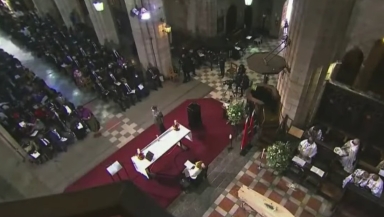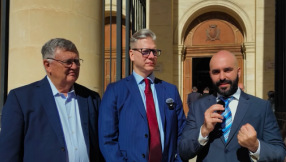
The funeral of Archbishop Desmond Tutu, who died last week aged 90, has taken place in Cape Town.
Tutu received a state funeral held inside the city's St George's Cathedral and attended by his widow Leah Tutu.
During the requiem mass, Leah was presented with the South African flag by the country's President Cyril Ramaphosa.
The funeral was held after his body lay in state so that members of the public could pay their respects.
Tutu was a Nobel Peace Prize winner and Archbishop of Cape Town from 1986 to 1996, during which time he railed against apartheid.
He is to be buried at the cathedral.
Addressing mourners during the mass, President Ramaphosa said Tutu was "our moral compass and national conscience".
"Our departed father was a crusader in the struggle for freedom, for justice, for equality and for peace, not just in South Africa, the country of his birth, but around the world," he said.
The Archbishop of Canterbury Justin Welby paid tribute to Tutu in a video message.
"Archbishop Tutu lit up the world," he said.
He continued, "That light has lit up countries globally that were struggling with fear, conflict, persecution, oppression, where the marginalised suffered.
"When we were in the dark, he brought light. For me to praise him is like a mouse giving tribute to an elephant.
"South Africa has given us extraordinary examples of towering leaders of the rainbow nation with President Nelson Mandela and Archbishop Tutu."
He added, "Many Nobel winners' lights have grown dimmer over time, but Archbishop Tutu's has grown brighter."













